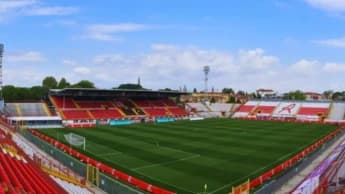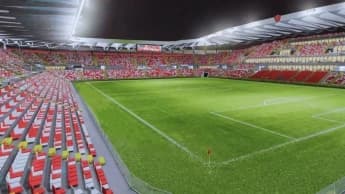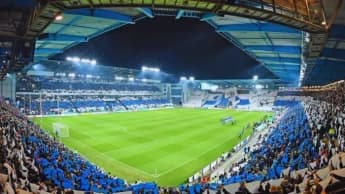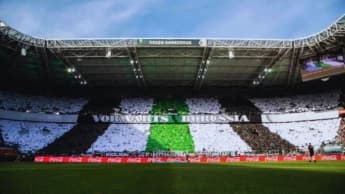Tivoli Stadion Tirol: A Modern Football Fortress in the Heart of Innsbruck

From its inception in 2000 to its role in UEFA Euro 2008, Tivoli Stadion Tirol has become a cornerstone of Austrian football, blending modern design with a vibrant fan culture.
Introduction
Tivoli Stadion Tirol, originally known as Tivoli-Neu, is a modern multi-purpose stadium located in Innsbruck, Austria. Since its opening in 2000, it has served as the home ground for WSG Tirol, a team in the Austrian Bundesliga, and Raiders Tirol, a franchise in the European League of Football. With a capacity of 17,400, the stadium is renowned for its intimate atmosphere, modern amenities, and adaptability, making it a key venue in Austrian football. Its temporary expansion to 30,000 seats for UEFA Euro 2008 further solidified its reputation as a premier sporting facility in Europe.
History and Construction
Tivoli Stadion Tirol was constructed in 2000 to replace the original Tivoli Stadium, which had served Innsbruck for decades. The new stadium was designed to meet modern standards, offering improved facilities for players, officials, and spectators. With an initial capacity of 17,400, it quickly became the focal point for football in the region, hosting domestic league matches and international fixtures.
One of the most significant moments in the stadium’s history came in 2008, when Austria co-hosted the UEFA European Championship. To meet UEFA’s requirements, the stadium underwent a temporary expansion, increasing its capacity to 30,000. This transformation allowed Tivoli Stadion Tirol to host several high-profile matches during the tournament, including group stage games and a quarterfinal. The expansion showcased the stadium’s versatility and ability to accommodate large-scale international events.
The stadium’s North Stand, equipped with rail seats for safe standing, is a standout feature that enhances the matchday experience. This design element reflects modern trends in stadium architecture, prioritizing fan engagement and safety. Over the years, Tivoli Stadion Tirol has continued to evolve, maintaining its status as a key venue in Austrian football.
Architectural and Design Features
Tivoli Stadion Tirol’s design combines functionality with modern aesthetics, creating a venue that is both practical and visually appealing. The stadium’s seating layout ensures clear sightlines from every section, bringing fans closer to the action and fostering an intimate atmosphere. The North Stand, with its rail seats, is a highlight, allowing for safe standing and creating a vibrant environment for passionate supporters.
The stadium’s roof covers the majority of the seating areas, providing protection from the elements while allowing natural light to reach the pitch. This design enhances the acoustics, amplifying crowd noise and creating an electric atmosphere during matches. The pitch itself meets professional standards, ensuring optimal playing conditions for both football and American football.
For UEFA Euro 2008, the stadium’s temporary expansion demonstrated its adaptability. Additional seating structures were installed to increase capacity, and these were removed after the tournament, returning the stadium to its original configuration. This flexibility highlights the stadium’s ability to host both domestic and international events.
Modern amenities, including concession stands, VIP lounges, and accessibility features, ensure a comfortable experience for all spectators. The stadium’s commitment to inclusivity is evident in its wheelchair-accessible seating areas and family-friendly sections, making it a welcoming venue for fans of all ages.
Atmosphere and Fan Experience
Tivoli Stadion Tirol is renowned for its lively atmosphere, driven by the passionate support of WSG Tirol and Raiders Tirol fans. The North Stand, with its safe-standing rail seats, is the heart of the stadium’s energy, where fans chant, sing, and wave banners throughout the match. The close proximity of the stands to the pitch amplifies the noise, creating an intimidating environment for visiting teams.
The stadium’s acoustics further enhance the matchday experience, with the roof structure helping to amplify crowd noise. This creates a reverberating effect that adds to the intensity of the atmosphere, especially during crucial moments in the game. The combination of passionate supporters and a well-designed venue ensures that every match at Tivoli Stadion Tirol is a memorable experience.
Concession stands offering traditional Austrian snacks and international cuisine add to the fan experience, while VIP and hospitality areas provide premium services for those seeking a more luxurious setting. The stadium’s accessibility features, including public transportation links and parking facilities, make it easy for fans to attend matches.
During UEFA Euro 2008, the stadium’s atmosphere reached new heights, with fans from across Europe filling the stands. The tournament showcased the stadium’s ability to host international events while maintaining its distinctive character. The passionate support of local fans, combined with the presence of international visitors, created an unforgettable experience.
Notable Events and Moments
Tivoli Stadion Tirol has been the stage for numerous historic moments in Austrian football. Its role in UEFA Euro 2008 is a highlight, with the stadium hosting several high-profile matches, including a quarterfinal. The tournament brought international recognition to the venue, showcasing its ability to accommodate elite-level football.
In domestic football, the stadium has witnessed WSG Tirol’s key victories and dramatic moments in the Austrian Bundesliga. The club’s performances at Tivoli Stadion Tirol have shaped their standing in Austrian football, with crucial wins and survival battles adding to the stadium’s storied history.
The stadium has also hosted memorable Austrian Cup matches, featuring thrilling encounters and underdog victories. The knockout format of the competition has led to dramatic moments, including penalty shootouts and last-minute goals, that have left a lasting impression on fans.
For Raiders Tirol, the stadium has become a fortress in the European League of Football. The team’s matches at Tivoli Stadion Tirol have attracted large crowds, adding to the venue’s versatility and reputation as a multi-purpose sporting facility.
Individual performances have also left their mark on the stadium’s history. From hat-tricks in league matches to heroic goalkeeping displays, Tivoli Stadion Tirol has been the backdrop for career-defining moments for many players.
Records and Legacy
Tivoli Stadion Tirol’s legacy is built on its ability to host major events and create unforgettable moments. The stadium’s record attendance of 30,000 during UEFA Euro 2008 remains a highlight, showcasing its capacity to accommodate large crowds for international tournaments.
In domestic football, the stadium has been the site of WSG Tirol’s most significant achievements, including key victories and survival battles in the Austrian Bundesliga. The club’s performances at Tivoli Stadion Tirol have shaped their identity and standing in Austrian football.
The stadium’s design and modern amenities have set a standard for football venues in Austria. The inclusion of safe-standing rail seats in the North Stand reflects a commitment to fan engagement and safety, while the stadium’s accessibility features ensure a welcoming experience for all spectators.
Tivoli Stadion Tirol’s role in UEFA Euro 2008 and its continued use for domestic and international events have cemented its place in Austrian football history. The stadium’s ability to adapt to different events, from European tournaments to local league games, highlights its importance within Austria’s sporting landscape.
Conclusion
Tivoli Stadion Tirol stands as a symbol of modern football in Austria, blending state-of-the-art design with a vibrant fan culture. From its role in UEFA Euro 2008 to its ongoing contributions to WSG Tirol and Raiders Tirol, the stadium has become a cornerstone of Innsbruck’s sporting identity. Its ability to create unforgettable moments, coupled with its commitment to modern stadium standards, ensures that Tivoli Stadion Tirol will remain a key venue in Austrian football for years to come.






